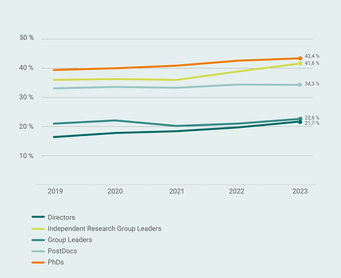Positive developments in the representation of female scientists across various stages of scientific careers
The Max Planck Society's Voluntary Commitment (SVP) aims to achieve two primary objectives: increasing the representation of female scientists in leadership positions by one percentage point annually until 2030 and ensuring that each Max Planck Institute has at least one female director. A review of the 2023 data indicates progress towards these goals: the MPG successfully elevated the proportion of female scientists in newly appointed leadership roles (W3/female directors and W2/independent research group leaders). With appointment rates reaching 54.5% and 66% respectively, these figures notably surpass the MPG's target benchmarks.

"It's incredibly gratifying to see our remarkable success in appointing female scientists to leadership roles in 2023," says Asifa Akthar from the Vice Presidents Circle. Since the summer of 2023, this has been composed of three female and one male scientist. “This demonstrates that the MPG has surpassed the majority of its self-imposed targets for the year." Out of the eleven appointed directors, six were women and five were men, accounting for a quota of 54.5 percent. The situation is even more promising for independent research group leaders (W2), where out of the 27 new appointments, 18 are women and nine are men, resulting in a ratio of 66 percent. These staffing ratios reflect the proportion of vacant positions filled by women. Additionally, it is worth noting that a significant number of women in leading positions are recruited from abroad.

There is still room for improvement at the Group Leader level and within the TVöD area, despite exceeding the annual target of one percentage point. It is evident that efforts to enhance the representation of female scientists need to be intensified, especially considering that the current proportion stands at only 22.6 percent. This urgency extends to young female researchers as well: although there is a slight increase in the proportion of female doctoral students from 42.6% in 2022 to 43.4% in 2023, the number of female postdocs is slightly decreasing from 34.4% in 2022 to 34.3% in 2023. The persistent issue of the "leaky pipeline" after the PhD phase underscores the necessity for measures such as the implementation of an interdisciplinary postdoc program aimed at mitigating this trend.
Long-term commitment begins to pay off
Behind the successes, both significant and incremental, lies a long-term, steadfast commitment to initiating and implementing a wide range of measures and initiatives. These efforts encompass various aspects, from strong leadership dedication to the redesign and expansion of staff development initiatives, and from diligent adherence to staffing quotas to enhanced internal monitoring processes and a focus on gender equitable recruitment procedures. Additionally, the introduction of digital and local training sessions on "Diversity and Unconscious Bias" across the Max Planck Society, alongside centrally funded surveys on work culture and workload, serves as vital building blocks for fostering a more inclusive and appreciative organizational culture. These initiatives provide valuable institute-specific data on work environments, enabling informed strategies to further promote equal opportunities in career advancement.
We need a cultural change to remain competitive
"Moreover, it is not just about enriching the Society with the highest-caliber international scientists. It is also about making them feel welcome when they join the Society. We need a cultural change in the MPG to remain competitive. I know that it’s not trivial as there are many complex issues that need to be addressed. However, it’s a challenge that we definitely need to be tackling right now!," says Vice President Asifa Akthar.
An essential aspect of implementing MPG-wide, centralized gender equality standards is their adaptation and implementation at the individual institutes and facilities. This requires careful adjustment of common goals and measures to the decentralized professional, cultural, and regional contexts. After all, the work culture and sense of inclusivity are shaped and perceived differently at each individual location. It is at these sites that the majority of recruitment and evaluation processes take place, and where equal opportunity career development is practiced. Consequently, institution-specific equality policies, including the prevention of sexual harassment, play a crucial role.
Career boost for female scientists
Lise Meitner Excellence Programme
The Lise Meitner Excellence Programme is one of the Max Planck Society’s initiatives aimed at attracting more exceptional women to careers in science, facilitating their career advancement with equal opportunities, and ensuring their retention within the MPG. Launched in 2018, initially as a four-year pilot phase, the programme has demonstrated its effectiveness. One group has already been appointed as Max Planck Directors, and another one is about to do so. Additionally, four Lise Meitner Groups have transitioned into permanent positions following positive evaluations on the tenure track.
Following minor adjustments, the duration of the groups under the Lise Meitner Excellence Programme has been extended from five to six years, with an additional "family break” year now integrated into the funding programme. Currently, a call is open from February 28, 2024, to April 10, 2024, with up to twelve positions available.
Minerva Fast Track (separate page under construction - more text there)
The Minerva Fast Track program starts much earlier and allows outstanding female researchers to plan their long-term careers. This programme provides funding immediately after the Ph.D. or first postdoc, for a maximum of three years, with the goal of applying for a Max Planck Research Group with an open topic. Statistical analysis demonstrates the effectiveness of this approach: five out of the 19 fellows from 2014 to 2020 are now leading a research group within the MPG, while six others have progressed in their careers outside the MPG, such as becoming professors or assistant professors.
